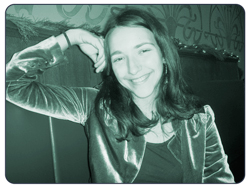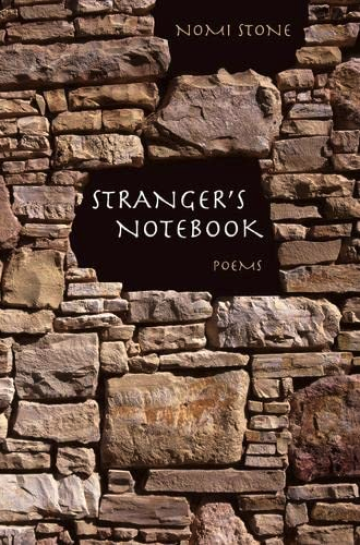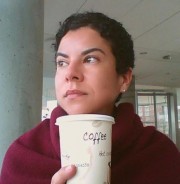Telling Tales - One Writer + One Focus = One Story - Nomi Stone
An occasional look into pivotal moments in writers' lives.
"The spaces I have been privy to are phenomenally unusual." - Nomi Stone
Based upon my conversation with poet Nomi Stone, I agree with her assessment of her experiences. Stranger's Notebook (Triquarterly, 2008), her first book of poetry, chronicles her year living within a tiny insular Jewish village in Tunisia – a stranger in an island community, itself one of “otherness.” The poems in her latest work in progress, are based on her observation of pre-deployment exercises staged by the U.S. military in mock Middle Eastern villages across America. Ms. Stone's work caused me to ask her, “So how did a nice female poet/anthropologist/ethnographer like you end up in places like that?” In these edited excerpts from my conversation with her, Ms. Stone highlights the blurring of boundaries that occurs when – and is necessary for – engaging with “closed” communities.
Q. Which were you first: a poet or an observer?
A. I began writing poems when I was six years old. I was a poet first and always, but writing poetry is inextricable from observing my own inscape and rendering it porous to the world. As writers, we are told to write what we know. I want to decenter myself to enlarge that knowing. The year after I graduated college, I went on a poetry Fulbright to the island of Djerba, Tunisia and lived among a tiny, insular Jewish community in North Africa. I found myself in this dusty village, steeped in ritual and tradition, surrounded on one side by olive groves and octopus fishers and on the other side by glitzy casinos. It was after the year in Djerba that I decided to become an anthropologist, as a gift to my poems and a gift to my life. One of my mentors at Columbia, Mick Taussig, teaches a class called the Anthropology of Estrangement, which inspired me. He asks students to make the familiar strange and the strange familiar. I think this movement is necessary as both a poet and an observer.
Q. How did you get involved in fieldwork observing deployment exercises? Did you enter the project knowing that you would also approach it as a poet?
A. I pursue every project as both a poet and an academic. When this project began, I didn't imagine the richness it would yield in both directions. I began in 2009 broadly interviewing Iraqis who had worked with the American military in some capacity or another, e.g., interpreters, bodyguards, and drivers. I learned about a set of post 9-11, pre-deployment exercises staged by the U.S. military in mock Middle Eastern villages across the deserts and forests of America. The military employed Iraqi and Afghan role-players in these spaces to theatricalize war for the training soldiers. I was able to observe these exercises through persistence and dumb luck. I called every military base in America. No one offered me assistance or entry until, I connected with a PR officer with a literary soul. His particular base in California admits journalists for mini-visits, and I went in as a quasi-journalist. Once I was in, one thing led to another, and ultimately to my sustained interaction and permission to observe.
I went to a mock village for the first time in 2010. I nearly stopped breathing. Hollywood artifice pulsed with an uncanny core of the real. I was put up in a mock Baghdadi hotel in the middle of the Mojave Desert, its check-in area decorated with platters of fake kabobs. Outside, a mock Babylonian statue towered over a fake traffic circle. A mock mosque contained only bullet shells within as a clue for the training soldiers. Mock blood and threads of mock organs from a shoot-out spumed over the set. And in the fake market, Iraqis wearing lazer-tag like belts to register their notional deaths, played war every day.
These spaces demanded the most careful precision in my observation. I invoked the anthropologist to think about, for example, how “authenticity” is referenced by the military through the construction of the sets. Which gestures – a prayer rug; Arabic graffiti; the call to prayer; and in some simulations, even odors designed to mimic mass graves – generate a sensory apparatus for both the training soldiers and the Middle Eastern role-players inside?
Meanwhile, it is my poet-side who inflects these spaces with the affect, emotion, and sensation that a cursory observer would not glean. I have spent so much time now inside these military spaces. I have had many conversations with the soldiers who formulate the scenarios and the defense contractors who execute them. I spent time with the role-players, weaving back and forth between the simulations and the “real” of their outside lives: cooking lunch, going to the mall, studying for their citizenship exams. I have sat with the role-players in the breaks in between the role-plays in the hollow houses in the mock village. I have heard their jokes, in Arabic dialect, about politics, about religion, about the world outside and the theater space we share. Poetry can connect the world we see with our interior colors. The poems of my latest collection are saturated in my own affects and inscape and the changing affects of the soldiers and role-players. The poetry is always first for me, but the loop is continuous: I import that affective language into my academic writing. And my academic work may prompt me to read a book by Derrida, and that evolving thought may renew the conceptual lines of the poems.
Q. After reading "Stranger's Notebook" and selections from your new collection, I noted a theme of an-outsider-among-outsiders, and the tensions between defending and preserving v. accepting and belonging. Are these observations accurate?
A. I believe in the possibility that there is no inside and outside. This leap undoes, for me, my own discipline of anthropology and the constructs that define things such as nation, community, and identity. If there is no inside and outside, we all move through and are constituted by the everything. Why shouldn't a nice girl wander around a military forest in America, jabbering in Arabic with a bunch of role players who are acting out a version of their country, alternately laughing at the artifice and trying to make money and stay alive? What is the forest in that moment making them into? There isn't perhaps such a separate delineation of theater and real, strange and unstrange, inside and outside. It is all commingled. Deleuze suggests that we are alive to perpetual possibilities of becomings. He asks us to become-animal and become-plant and become-mineral. Why not?
Returning to these constructs and binaries that I want so much to transcend: They do act in the world. These constructs make some things possible and other things less possible. In both Djerba and in the military base, there have been potent moments of negotiating what inside and outside might mean in peoples' lives, especially in relation to power. Your observation is very accurate: My favorite positions are those on the periphery that enable me to watch and gather. I am drawn to outsiders and their delicate relationship to preserving identity v. belonging in the larger group. Difference across boundaries alternately provokes either horror or marvel. Permeability is often generative, but insistence on serial sameness is a form of violence.
Boundary locations are thus often both haunted and fertile spaces. In Djerba, the Jewish community living on the island for centuries, and perhaps millennia, by their own tale of origin, claimed to be outsiders. In the military base, Middle Eastern role-players—conceived as representative repositories of knowledge about culture by the military— are seen as outsiders and collaborators by “their own.” And as I have written about others, and in particular about “outsiders,” I have spent my last decade in a meta dance of preserving and belonging, mediating my own position as an outsider. What I hope for most is to shape-change with people and the world in tandem.
Q. I'd like to hear about a moment where the lines that separate observer/participant, immersion/detachment, real-life/mock-life blurred?
A: For almost 40 years, U.S. Special Forces have trained in an area in North Carolina, re-imagined as a fictional country called “Pineland.” These training exercises — and the blurring between the real and the unreal — have striated that land for decades. When the exercises began, locals thought President Kennedy had sent in armies to confiscate their guns. Once the rumors calmed, area residents lent the army their farms for war games and cooked vats of chicken and dumplings for the soldiers. In the towns, captured role-players were “hog-tied” on the sidewalks and local jail cells were used. Bands of boys put on their own ad hoc armbands and dashed through the woods, trying to slip into the exercises as guerilla fighters, and in effect, pretending to be the pretenders.
My point here is that Pineland has always been a thickly layered simulation where a nexus of people have felt they were participating. After acting as a strict observer for the majority of the role-plays, I was allowed to participate on several occasions. I played an NGO worker once, and the girlfriend of a guerilla another time. No one can break role in Pineland: Training soldiers will not get their green beret if they do so. The contracted role-players will lose their jobs if they do so.
On one occasion, I tried to break role when I was misread by the soldiers. But that is not how the game works. There is no time-out. There is no break in the storyline. The story churns onward, and you wonder which story takes precedence, what is real, and where you are within the whole thing. The poems evoke, through language and form, the pure enclosure of Pineland. I am writing about a space of hyper-artifice via the war game, but at the same time, there is a perpetual risk of the precipice where the fake and real entwine and double back, especially for soldiers and for role-players who have lived war before. With all this in mind, I have tried to write a doorless book where you are not permitted to breathe until the last poem.
 Nomi Stone - https://nomistone.net/index.html
Nomi Stone - https://nomistone.net/index.html

 Nancy Méndez-Booth is a fiction writer. She teaches writing and Latino/a literature and culture in New York and New Jersey. Her work has appeared in Jet Fuel Review, mamapedia.com, The Packinghouse Review, phat'titude Literary Magazine, Philadelphia Stories, Poets & Writers, and realsimple.com. She is looking for a publisher for Underbelly, a collection of linked short stories. She blogs regularly at
Nancy Méndez-Booth is a fiction writer. She teaches writing and Latino/a literature and culture in New York and New Jersey. Her work has appeared in Jet Fuel Review, mamapedia.com, The Packinghouse Review, phat'titude Literary Magazine, Philadelphia Stories, Poets & Writers, and realsimple.com. She is looking for a publisher for Underbelly, a collection of linked short stories. She blogs regularly at